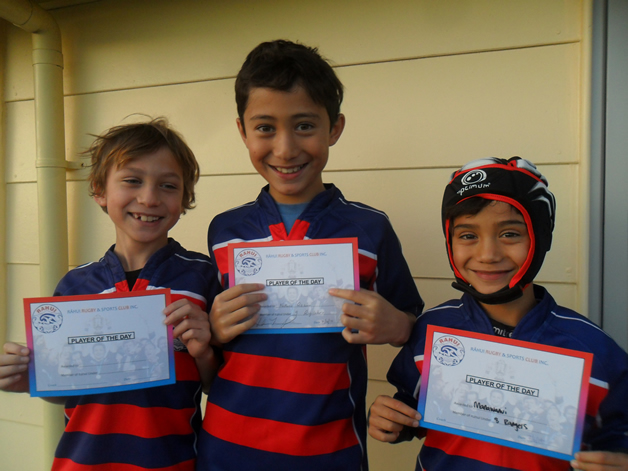He pēpi
Katea Karakia Ripikoi-Thompson i whānau mai i te 10 May, an 8lb baby girl born at Waitakere Hospital in Auckland to proud parents Kama and Aidan Ripikoi-Thompson and big brother Malek-Tawana; and mokopuna of Rosalind Gemmell-Ripikoi and the late Sharland Ripikoi (Rip).
Katea is the second great-grandchild of Moana and Henry Gemmell. Nau mai haere mai e te mokopuna.

Welcome to Baby Katea.
Congratulations
Congratulations to Beau Cameron (son of Te Aroha Taylor) and Nakutera Kāhu (son of Kim Kāhu) on being selected for the Under 11 Town and Country rugby team for Marlborough. Well done kōrua.

From left, Nakutera Kāhu, Brayden Brown and Beau Cameron.
Lynton Downs planting day
In May Lynton Downs School had a Restoration Planting Day in a wetland area. The students worked with Gina Solomon and Te Rūnanga o Kaikōura to agree on the name “Poipoi Kotare” for the newly revealed stream. The students embraced the project with enthusiasm, working alongside parents, teachers and zone committee members.
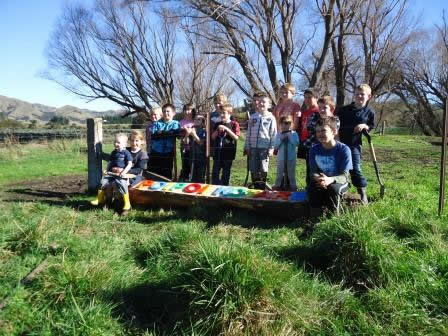
Lynton Downs Primary School pupils at the Planting Day.
He pēpi
Welcome to these beautiful twins, Eva Rose Aroha and Vincent Frederick Lennon born in Tāmaki Makaurau on 8 March 2013.
Congratulations to proud parents Christopher Piri and Kiely Murphy, proud Tāua and Pōua Amokura Tainui and Frederick Murphy; and also to proud Great-Tāua and Great-Pōua Albany Harry, Freda Elizabeth Tainui, and Eliza and William Murphy.
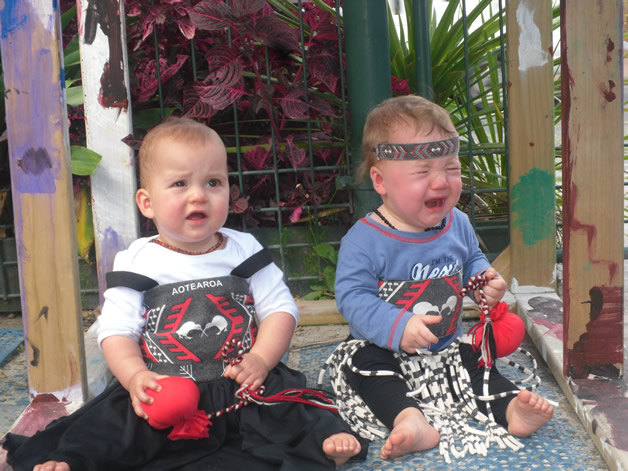
Eva Rose Aroha and Vincent Frederick Lennon at day care dressed up for Māori day.
Westland High student exchange
Whakataerangi White, Brooke Parker and Deja Tainui have been chosen to participate in the Westland High School exchange to Japan in September and October. The two kaiako who will be travelling with our tamariki are Karati Metcalf and Laura Mills.
The exchange will enable our students to experience Japanese culture first-hand. They will attend school and live with a Japanese host family. The students will increase their understanding of their own and another’s culture; and they will be sharing our culture through kapa haka performances. We hope you all travel well and good luck for all your adventures.
There will be two wishing wells – one located at Waewae Pounamu in Hokitika and the other at Arahura Marae – so people can contribute to the fundraising for this kaupapa. If anyone would like to koha a donation please contact Hamiria Hutana on 03 755 6451 or email [email protected]
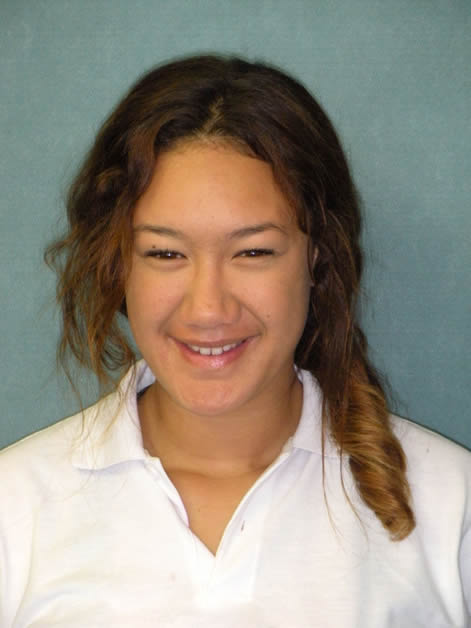
Whakataerangi White.
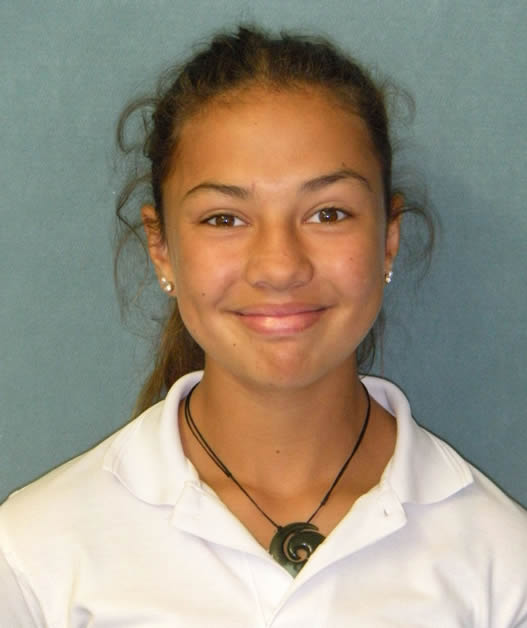
Brooke Parker.
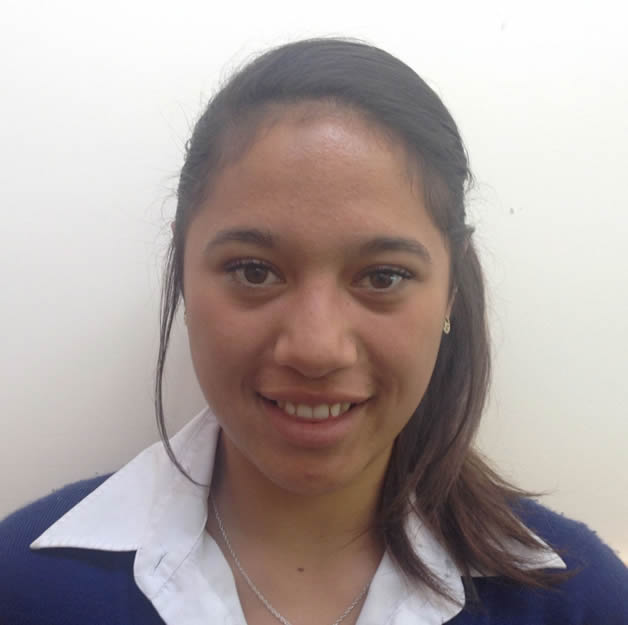
Deja Tainui.
School visit
Over the course of the year we enjoy the company of various schools who travel from near and far to enjoy our marae and the beauty of our location.
Schools this year have included Windwhistle School, Hillmorton High and more recently, Cashmere High, who travelled over as part of their Manu Kōrero programme. It is the first time since the earthquakes that Cashmere has been to visit, so big mihi to Whaea Miriama Setterington and whānau member Detroit Stirling for bringing their students to our wonderful bay.
Marae bookings are steady at present but as we move into the summer, booking requests will increase. We already have a number for Christmas and New Year so please book early to save disappointment. To book the marae please contact the rūnanga office on 03 365 3281 or email [email protected]

Cashmere High students enjoying the sites of Koukourārata.
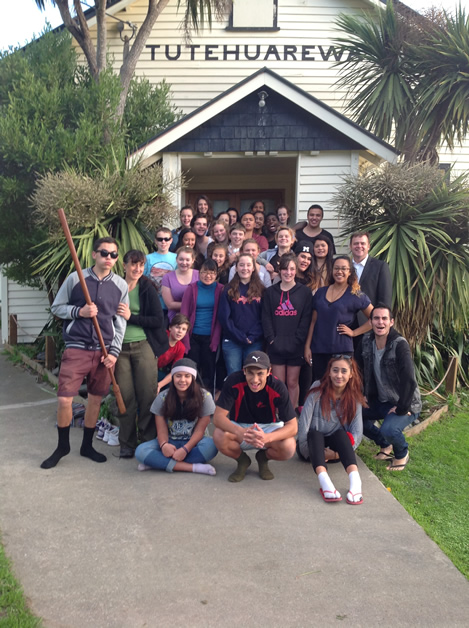

Film appearance
Miriam Robinson, (daughter of Nige and Liz), is soon to grace our screens in the six-part Christchurch earthquake drama series ‘Hope and Wire’. The show will begin screening in July on TV3.
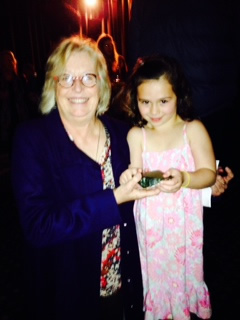
Miriam Robinson, 6, with writer, producer, director, Gaylene Preston. They hold the pounamu gifted to the show by Ngāi Tahu.
Military course an inspiration
Sarah Thomas attended the Limited Service Volunteer course at Burnham Military Camp from 24 March – 3 May.
The course is run by the New Zealand Defence Department, Ministry of Social Development and WINZ and is highly recommended for young people aged between 18 and 25. It aims to promote core values and encourage and promote teamwork and life skills while improving self-motivation, self-confidence, trust, job prospects and initiative through a series of lectures, workshops and activities.
The course appealed to Sarah – who already has a diploma in outdoor leadership and management – especially the physical challenges. These included river crossing, touch rugby, inter-platoon challenges, army regulation fitness programmes, rock climbing, abseiling, tramping and lectures. They also stayed in tents at Godley Head for three days, helping to rebuild the track and working on other projects in conjunction with the Department of Conservation.
While attending the course, they came under military law and as such, were expected to comply with service laws, customs and regulations.
It is an open programme and any young people who fit within the age criteria can apply to attend, even if they are not on a Work and Income Benefit, providing they pass both medical and police checks.
For Sarah it was six weeks of total satisfaction and enjoyment and she excelled in a number of areas including the knot-tying competition against the instructor and the indoor rock climbing speed challenges. In the ‘Beep Test’ Sarah achieved a score of 11.3, which was significant considering the female requirement to enter the army is around 7.4. She later scored 12.
During the course Sarah was recognised with a number of awards including the platoon top student award for 2 Platoon, New Zealand Army regulation fitness level (RFL) first female and the New Zealand Army RFL 2.4k run for females under 12.20 minutes requirement. She was also awarded a certificate of merit, which is the top achievement level for the course; and she gained a First Aid certificate. Her most special honour though, was on ANZAC Day, when she was chosen to lay a wreath alongside the OC Youth Development Unit South, Major Lattimore, at the ANZAC Day parade.
Willie Apiata VC came to speak to the course members and also attended the final parade, where he chatted to graduates and members of the public. After having met him I can only say that he is one of New Zealand’s true gentlemen and a person with great mana.
Nā Graeme Thomas.
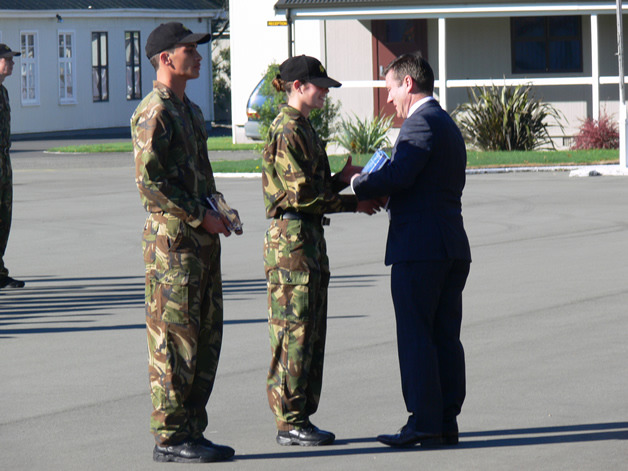
Sarah being presented with one of her awards at final parade by the Course Patron Hon Michael Woodhouse MP.
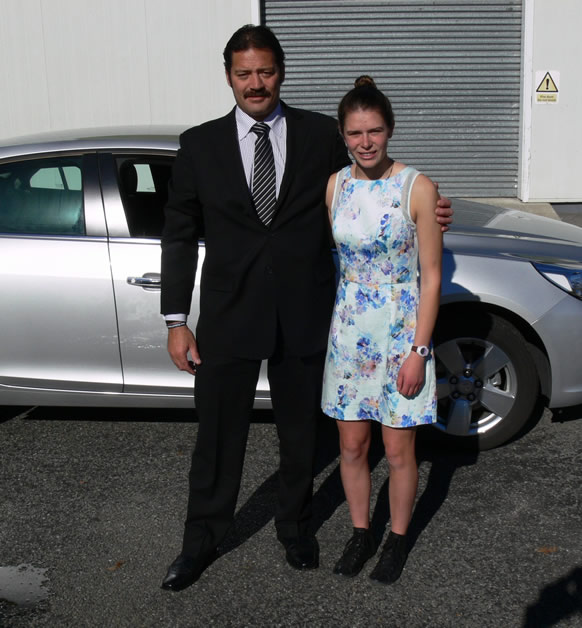
Sarah with Willie Apiata VC who stopped his vehicle to wish her well and have his photograph taken with her.
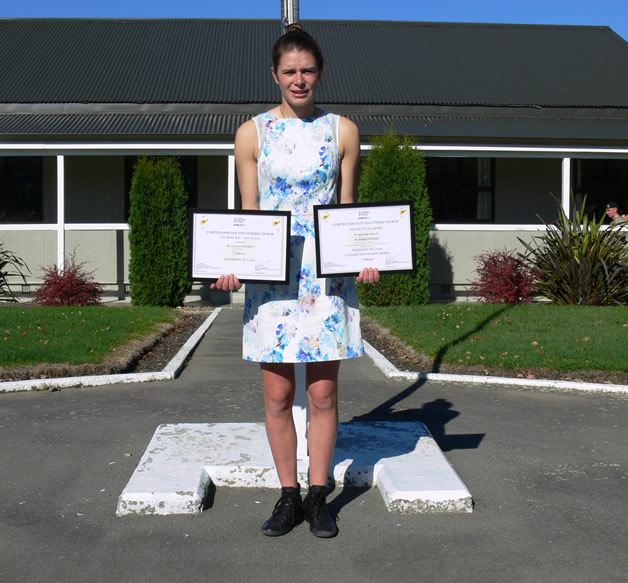
Sarah Thomas with her two awards – New Zealand RFL First Female and Woodhouse Class Platoon Top Student Award 2 Platoon.
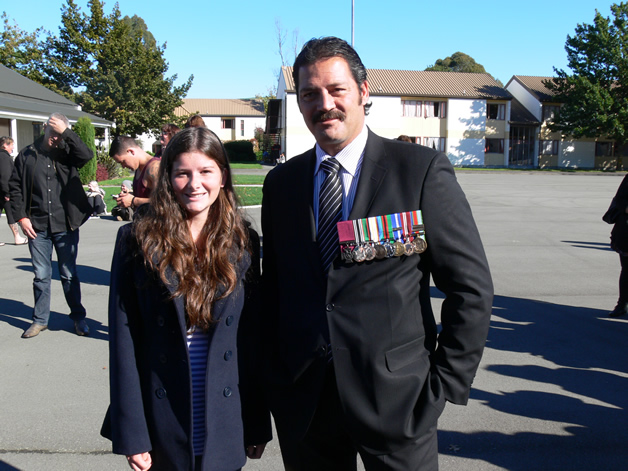
Rebekah Thomas with Willie Apiata.
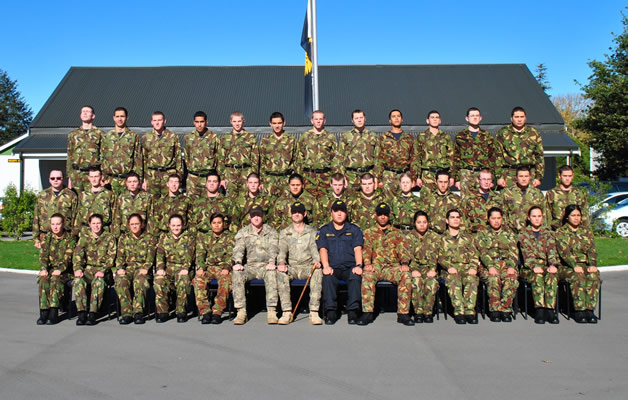
Sarah’s 2 Platoon.
He pēpi
On 28 February, Aoife and Niamh welcomed the arrival of their little sister, Ciara Scarlett Goldsmith. True to form Ciara followed in her big sisters’ footsteps tipping the scales at a healthy 9lb 10oz. Ciara is the third girl for Mum, Letitia, and Dad, Shannon. Dad reckons he has seen the writing on the wall and has decided to hang his boots up.
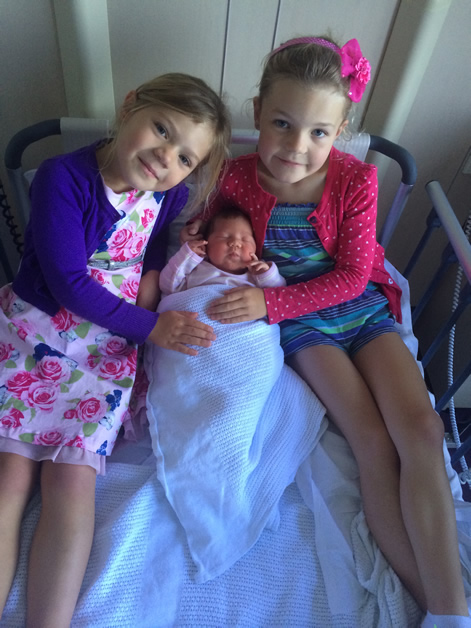
Proud big sisters Niamh and Aoife with Ciara Goldsmith.
Mau Taiaha training
Our whānau here at Puketeraki are working with Tūmai Ora Health Services to provide Mau Taiaha training for males of all ages. The training started on 21 May and will continue throughout the year (excluding school holidays). This is an open invitation to our whānau to come and get active whether it’s with your mates, or father and son. The training is held at the Waikouaiti Events Centre (Main street of Waikouaiti) every Wednesday, 4pm-6pm. Nō reira tama tū, tama ora, tama noho, tama māngere.
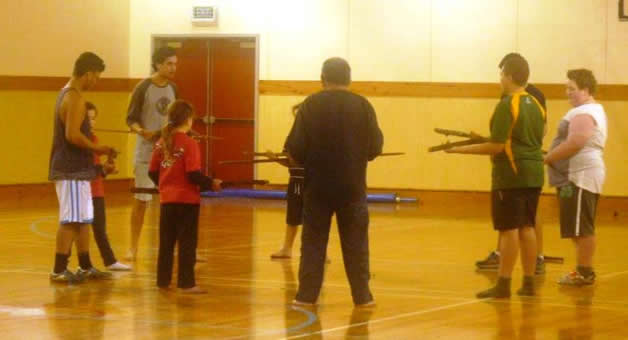
Waiariki Parata-Taiapa warms the group up at a mau taiaha training session at Waikouaiti Events Centre.
Congratulations
He mihi nunui ki a Koreana Wesley-Evans, who was second in the Ihaka Rawhiti Junior Māori section at the Ngā Manu Kōrero regional competitions in Murihiku recently. Koreana is in Year 9 at Bayfield High School in Dunedin and is the mokopuna of Moana Wesley from Ōtākou, and the late Margaret Evans (née Solomon) from Arowhenua.
Well done to Bayfield High School too. This is the first year the school had entries in both of the Māori sections, and that the school has been placed at the regional competition. Their entrant in the Pei Te Hurunui Jones/Senior Māori section, Lydia Anderson, was placed third.
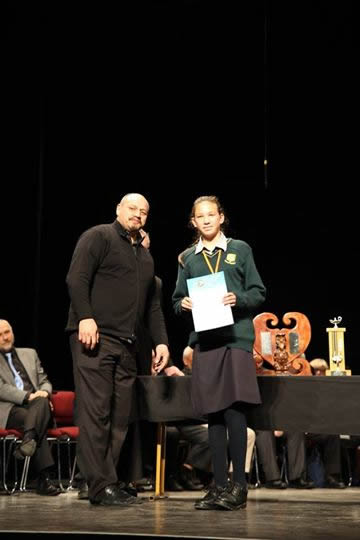
Koreana Wesley-Evans at the prize-giving.
Manu Kōrero success
Congratulations to Thomas Aerepo-Morgan for being the overall winner in the Pei Te Hurinui Jones Senior Māori Section at the Otago/Southland Regional Manu Kōrero Competition held in Invercargill on Friday, 6 June.
Thomas achieved this by gaining first place in the Impromptu Senior Māori Section for ‘Mā te tamaiti tōnā ake huarahi e para’ and prepared speech section for ‘He Toa Taumata Rau.’ I guess this will mean proud parents Mali Morgan and Daniel Aerepo will be doing lots of fundraising to get Thomas to the National Manu Kōrero competition in Napier later on this year. Ka mau te wehi.
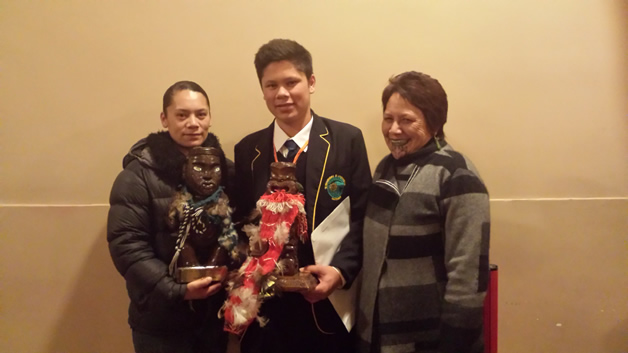
Thomas Aerepo-Morgan with his Mum, Mali Morgan, left and his nanny, Hana Morgan, right.
Rangatahi mōkihi and taiao wānanga
Over the weekend of 9–11 May, 28 rangatahi and supporters gathered for a mōkihi and taiao wānanga at Karanga Camp, just west of Auckland. The aim of the project was to foster cultural connection and identity, participation in Ngāi Tahutanga, and a greater understanding of some of the values, beliefs and cultural practices of our tīpuna.
On Friday evening one of our esteemed kaumātua, Kukupa Tirikatene, taught us about Māori spirituality, about Io and ngā atua, our part in the natural cycle, and how our caring for the environment flows into the way we care for our manuhiri, our visitors. He also taught tikanga marae, kaupapa, and the symbolism of some of the carvings and parts of Ngā Kete Wānanga Marae. We also learned hīmene, a whakamoemiti, a whakataukī, some expressions in te reo, and about the concept of tapu. Riki Bennett later enthralled us with his performance of, and fascinating kōrero about, taonga Pūoro, treasured Māori musical instruments.
On Saturday morning after karakia we harvested kōrari, the harakeke stalks and flax for making the mōkihi (reed boats). Another of our treasured kaumātua, Bones Rissetto, taught us how to make the mōkihi (or “mogi”), with the assistance of Antony Thorpe, Riki Bennett, and Jonathan Sargisson. Everyone got involved and helped out and we made two mōkihi waka, one to paddle and one to go on display. We took turns paddling our awesome waka on Lake Wainamu, and also had fun running and jumping on the sand dunes. In the evening we sang waiata, played guitar, told stories and jokes, and toasted marshmallows around the campfire.
On both mornings Jonathan recited he karakia mō te ata, “Ka haea te ata”, and on Sunday gave a kōrero to the early risers about the birds, and the environment, and the importance to our tīpuna of being alert to and in tune with the forest. A mini fire-making demonstration (from scratch) by Riki Bennett was a real hit with the boys, as was a hīkoi in the ngahere (forest), where Riki and Jonathan talked about Tāne Mahuta and traditional uses of our forest plants. We tasted some of the edible plants traditionally eaten or used for medicines by our tīpuna.
The wānanga would not have been possible without all the awhi and hard work of all those involved both in the preliminary stages and at the wānanga. Kei te mihi nui ki Te Kawerau a Maki, a big mihi to the tangata whenua, in particular spokesperson Rewi Spraggon. Ngā mihi aroha mō tā koutou tautoko mai ki tēnei kaupapa. Kei te mihi nui ki Te Rūnanga o Ngāi Tahu mō tā rātou putea tautoko ki tēnei kaupapa. Kei te mihi nui ki ngā ringa manaaki; Meri and Riki Kohi did an amazing job in the kitchen over the weekend; and Riki Bennett was a key link with tangata whenua, and invaluable in accessing the raupō (reeds), and guiding the harvesting and drying process in the months prior to the wānanga. He also organised storage at Cascades Ranger station, at no extra cost.
Ngā mihi nui to him and all the rangers at Cascades. Martin and Becky at the Corban Estate Arts Centre generously provided free access to one of their storage rooms, for storing the raupō that had been dried. Harvesting helpers in the months prior to the wānanga included Rawinia Puna, Maha Tomo and his friend Rob Smith and daughter, Riki Bennett, Jonathan Sargisson, Brendan McCarthy, Sophia Stevens and Corrina. Riki Bennett and Maha Tomo were our photographers throughout both the wānanga and harvesting process. Thanks also to all those from Karanga Camp. Jonathan Sargisson oversaw and coordinated the project, liaised with all involved, and ensured the weather stayed fine throughout the weekend. It was wonderful to to experience the unique gifts and talents, enthusiasm and hard work of each person and to hear what each person learnt from the wānanga.
Nō reira, ngā mihi aroha, ngā mihi nō te ngākau ki a koutou katoa. Tēnā koutou, tēnā koutou, tēnā rā tātou te whānau.
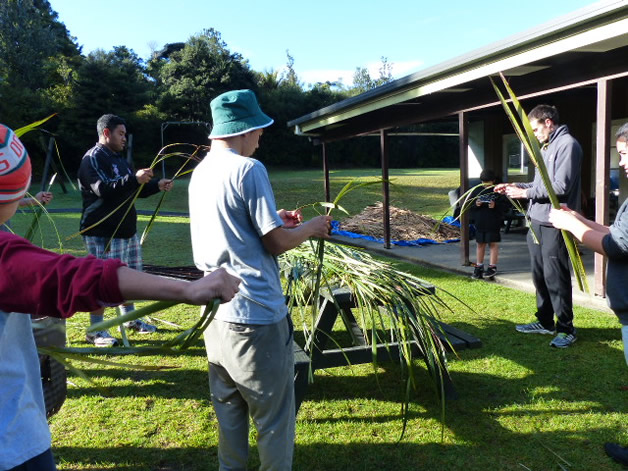
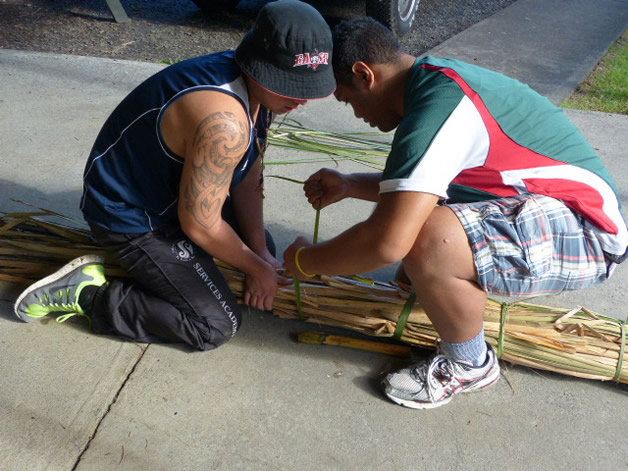


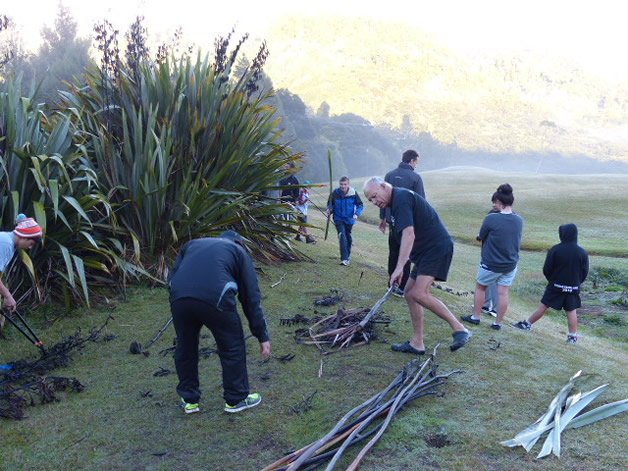
Tamariki achievements
These tamariki mokopuna of the Paahi/Tirikatene/Momo/Solomon whānau all received player of the day within the space of one week for their rugby teams. Nukuroa Rikihana and Te Wai Kāhua Paki are in the Under 9 Rāhui team and Manawanui Rikihana is in the Under 8 Rāhui team. Their tāua and pōua, Amiria and Don, were very proud. E tū Tūāhuriri.
Ngāi Tahu Farming sponsor West Eyreton School teams
Most of the Ngāi Tahu Farming employees are new to the small farming community of Eyrewell which is located 40 km northwest of Christchurch and sits within the takiwā of Ngāi Tūāhuriri. To help staff and their employees settle in, Ngāi Tahu Farming has been active in looking for ways to get involved in the community.
Back when the farms were first piloted in 2011, locals came forward with offers of industry advice and support while surrounding schools, sports clubs and community organisations helped with final land clearing (stick picking) as a community fundraiser.
To help keep this community link connection going, Ngāi Tahu Farming recently sponsored West Eyreton School, supplying branded navy jackets that will be used in a variety of ways to support the schools’ representative swimmers, triathletes, duathletes, cross country runners, school leaders, sports teams, debaters, choir and chess teams.
West Eyreton School is located close to the Ngāi Tahu Farming dairy farms at Eyrewell where a number of the students are from.
As you can see from the photos, these jackets have already been worn very proudly by the cross country team that competed in the Eyre Cluster Cross Country competition on Friday 23 May. Nine children qualified to compete against 11 other North Canterbury Schools at the Pegasus Cross Country and from this competition three have qualified for the Canterbury Cross Country competition to be held at Halswell Quarry. It’s been a great effort by the team.
The jackets are also being used by, the Year 7 & 8 representative rugby and netball teams, who are entered in a North Canterbury tournament that will take place every Friday afternoon for the next six weeks. Last week the rugby team won 90 – 20 and the netball team won 25 – 6. We wish all the competitors the best of luck over the coming weeks.
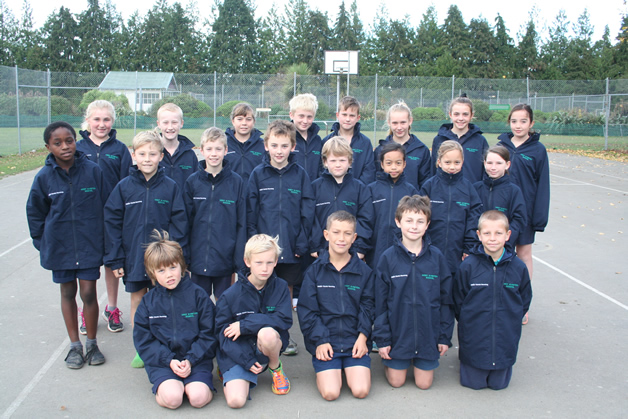
West Eyreton school representative cross country team.

Ngā Manu Kōrero ki Murihiku
The annual Otago-Southland Te Whakataetae o Ngā Manu Kōrero secondary school regional speech competition was hosted by Verdon College at the Civic Theatre, Invercargill on Friday 6 June. This year 42 speakers competed within the four sections. Pei Te Hurinui Jones – Senior Māori, Korimako – Senior English, Rāwhiti Ihaka – Junior Māori and Sir James Carroll – Junior English with impromptu speeches for the two senior sections.
Ka rere kā mihi ki kā manu tīoriori, kā korokoro tūī i tū kaha ki te atamira. Congratulations to all those students who rose to the challenge. It was an awesome occasion for rakatahi, kaiako and whānau alike. He mihi anō ki kā kaiako, kā tauira, kā kaimahi, ka kaiwhakawā, kā whānau me kā hoa i tautoko i te kaupapa nei. Also we acknowledge all those teachers, students, volunteers, judges, whānau and friends who supported and participated, and helped make this year’s contest such a success.
KMK were honoured to present taoka pounamu to the overall winners of the te reo Māori sections, both the Pei Te Hurinui Jones and Rāwhiti Ihaka section.
These recipients along with the other category winners will represent the region at this year’s national competition, being hosted in Hastings in September. Kia kaha rā koutou.
Pei Te Hurinui Jones – Senior Māori
Overall Winner: Thomas Aerepo-Morgan
2nd: Matariki Wehi
3rd equal: Isimeli Tuivaga and Lydia Anderson
Rāwhiti Ihaka Junior Māori
Overall Winner: Rianni Wainui-Dunn
2nd: Koreana Wesley-Evans
3rd: Te Anahera Parata
Korimako Senior English
Overall Winner: Jacobi Kohu-Morris
2nd: Kahurangi Flavell
3rd: Phaedra Ngahooro
Sir Turi Carroll Junior English
Winner: Dallas Bowler-Scott
2nd: Shakayla Andrews
3rd: Rangimarie Koroheke Edwards
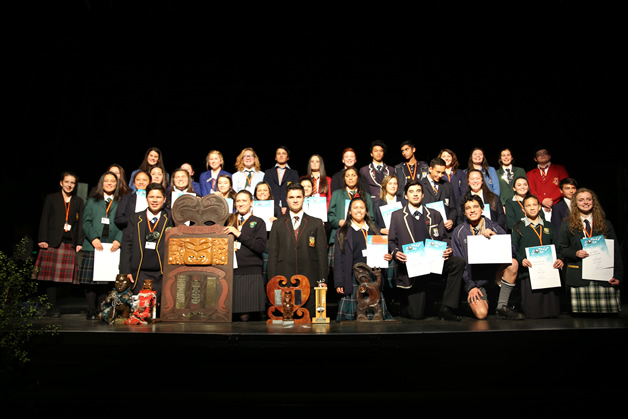
Ngā Manu Kōrero participants at the Ōtākou-Murihiku regional competition.
KMK Whānau Reo Fund
Whānau Reo Fund recipients Ariana Stevens, Arirangi Stevens, 9 and Komai Rider-Stevens, 4. Nō Arahura.
What are your whānau goals in regards to te reo Māori?
Our whānau goal is to use te reo in our home and our community every day. We want to increase our confidence to use te reo all the time, and improve our level of understanding. For the children this means looking for a school that will support their journey with te reo, and also making sure the reo we use in our home is more than just instructions or growling. I would also like to support my extended whānau to learn and use te reo if and when they wish to.
What are the benefits of applying for Whānau Reo funding?
The financial support my whānau gets from Whānau Reo enables us to attend events and connect with the wider reo speaking community that I would otherwise be unable to attend. For my whānau this means we have been able to develop and strengthen relationships within the community, practice using te reo in many different settings, and have some fun along the way.
What are some of the KMK events that your whānau has attended through the Whānau Reo fund?
We have been on haerenga to Amuri (Hanmer Springs) and Takapō (Tekapo). These trips have been a great chance to get out and about and do different activities with other whānau speaking te reo.
We also attend Kura Reo Kāi Tahu each year. This is a great chance for me to extend my own reo, and also improve my knowledge of Ngāi Tahu histories, stories, and dialect.
What are some of the benefits for your children in being able to speak two languages?
Being able to speak te reo has acted as a doorway for my children to parts of te ao Māori that they may have otherwise been unable to access and/or understand. It also means we can have conversations in public which may otherwise be a little embarrassing. (Komai told me one day, quite loudly, that they old man sitting next to us looked like Santa. Luckily she said it in te reo so he had no idea).
Is there anything else you would like to add, as words of encouragement for those who have just started this journey or for whānau who are thinking about learning te reo Māori?
Learning te reo Māori is challenging. And it’s challenging for everyone in different ways. I used to think that it was just me who found it difficult, but it’s everyone. What’s the point in saying that? So when you start your journey, and it gets tricky, you know that it’s not just you.
Luckily, there is a wonderful community of people who can provide support, ideas, resources, a sympathetic ear, or a kick up the bum (depending on what you need). Despite the challenges I have faced, not only learning te reo, but using te reo in my home with my children each day, it has definitely been worth it for my whānau.
Te tamaiti ākoka i te kāika, tau ai i te marae.
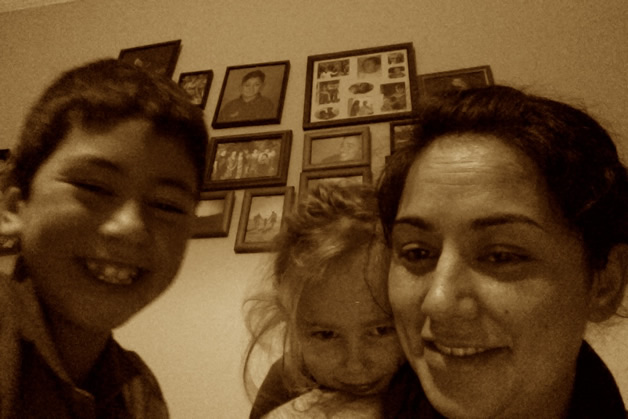
The Stevens whānau.
Tātou ki te Whutupōro ki Ōtepoti – Te tauwhāika o te Toka
On Saturday 24 May, whānau from Ōtautahi, Ōtepoti and Waihola gathered in Dunedin to spend time together, to celebrate te reo and support their teams in the great southern rugby battle, Highlanders v Crusaders.
Whānau met at Moana Pool and the morning was spent swimming, hydro sliding and making friends. This event was for te reo enthusiasts of all levels and it was inspiring for whānau to meet other whānau, who shared this common passion. Those who converse in te reo daily were examples for those whānau who are still striving with and learning the language. People were thankful for the opportunity to practice our tikaka of whanaukataka, manaakitaka and kotahitaka.
After the pool we went to the Otago Museum. Tamariki enjoyed visiting the pūrerehua (butterflies) and exploring the many activities at Discovery World. The next stop was Te Tumu (University of Otago) for face painting and parehe (pizza). Even though Tawhirimātea spent a bit of time blowing up a storm the whānau were not fazed and proceeded to Forsyth Barr Stadium for the mighty match. Mei kore te taiwhanga me te tuanui.
Te mutuka kē mai o te pai. Eighty of us joined the thousands of spectators at the game. Looking the part with our team colours and face paint we were lucky enough to have Georgia Dawson (Nō Arowhenua) from our group selected to go on the field at half time to participate in the half time entertainment.
Although the score didn’t favour the Highlanders, everyone enjoyed the’ edge of your seat’ finish and talent displayed by both teams. Kei ruka noa atu kā kapa Crusaders me te kapa Highlanders hoki.
